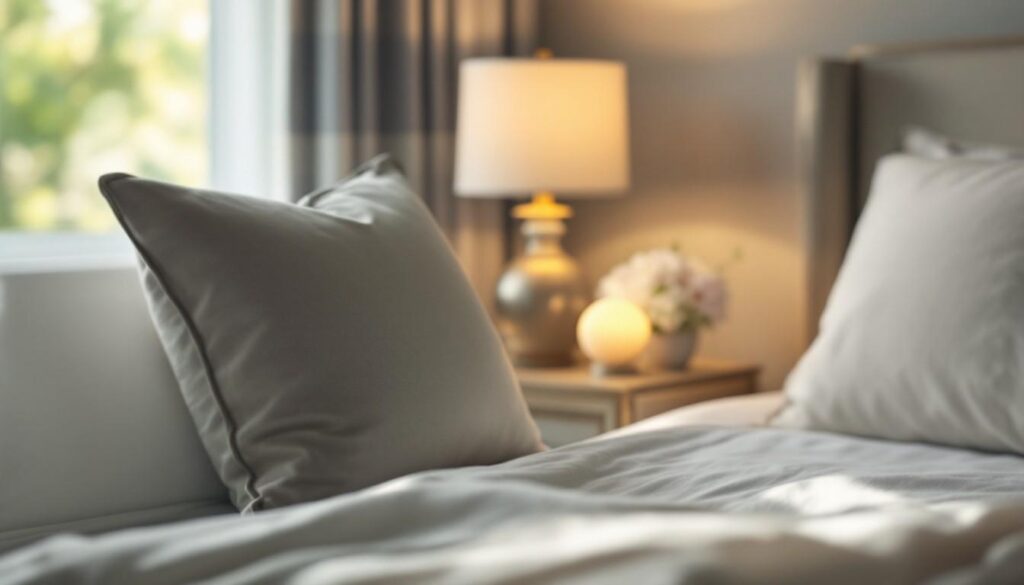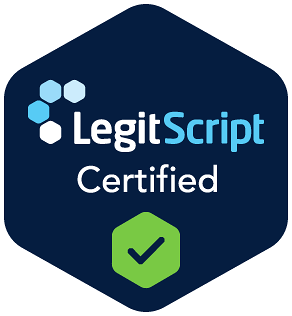Private addiction treatment offers personalized care and premium facilities, but understanding the financial investment is essential for families making this important decision.
The cost of private drug rehab varies significantly based on treatment type, program duration, and facility amenities. We at Amity Palm Beach believe transparency in pricing helps families plan effectively for recovery.
This guide breaks down private rehab expenses and explores payment options to make quality treatment accessible.
What Drives Private Rehab Pricing
Private drug rehab costs depend on three major factors that directly impact your investment. Treatment program length creates the most significant cost variation, with 30-day inpatient programs that cost between $14,000 and $27,000, while 60 to 90-day programs jump to $12,000 to $60,000 according to industry data. Intensive outpatient programs cost $500 to $650 per day, while partial hospitalization runs $350 to $450 daily. The intensity level matters just as much as duration – medical detox adds $250 to $800 per day, and dual diagnosis treatment for co-occurring mental health conditions increases costs by 20 to 40 percent due to specialized psychiatric care requirements.
Location and Amenities Impact Your Investment
Geographic location creates substantial price differences in private rehab costs. Urban facilities in California and Florida charge premium rates due to higher operating costs, while rural centers offer lower fees but fewer specialized services. Luxury facilities that provide private rooms, gourmet meals, and spa-like amenities can reach $80,000 monthly, compared to standard private facilities at $5,000 to $20,000. The amenity premium isn’t just about comfort – luxury centers typically offer lower patient-to-staff ratios of 3:1 versus 8:1 at standard facilities, which means more individualized attention and faster treatment adjustments.
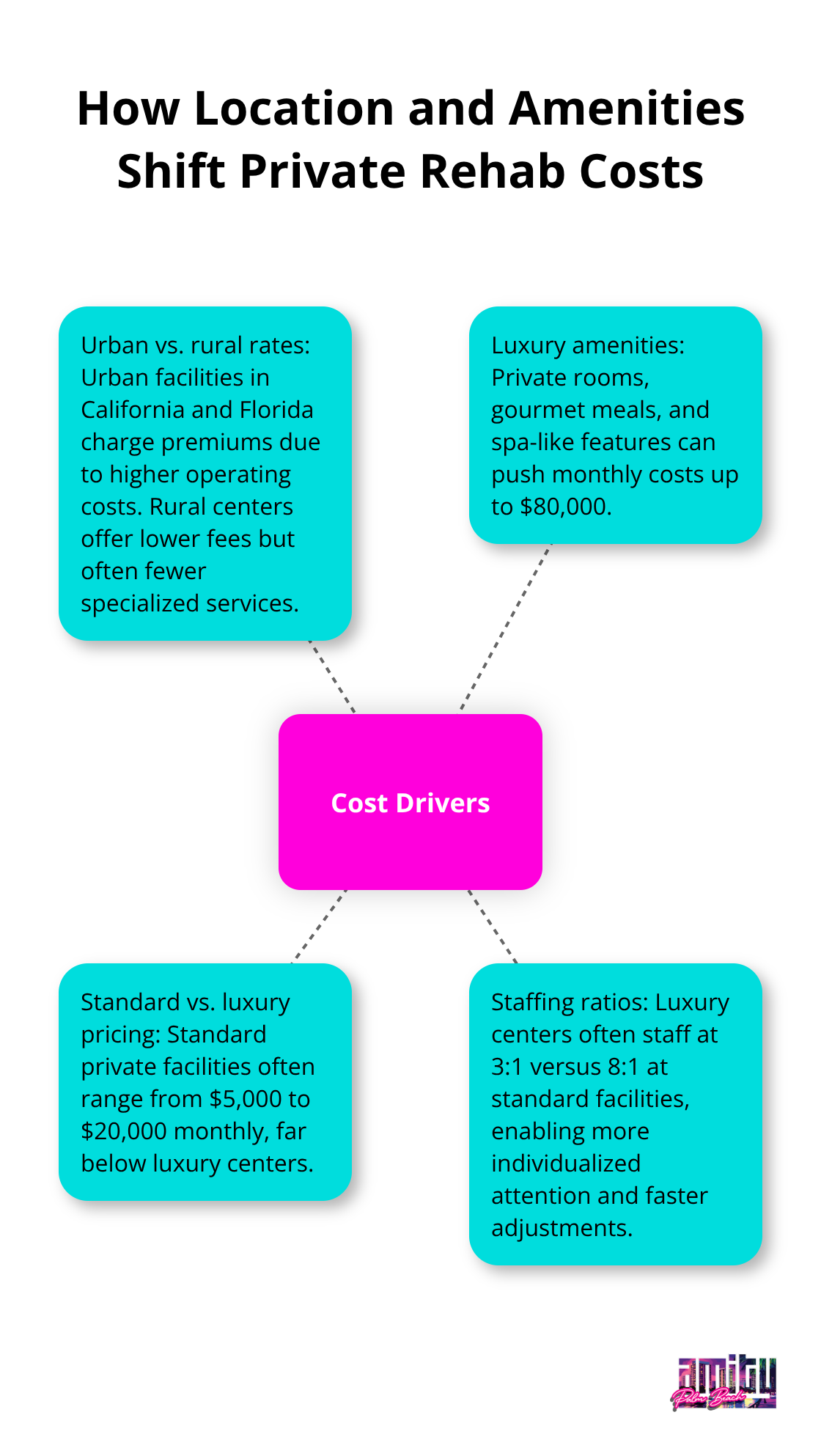
Staff Expertise and Specialized Services
Board-certified physicians, licensed therapists, and specialized addiction counselors command higher salaries, which directly affects treatment costs. Labor expenses represent a significant portion of most rehabilitation centers’ budgets, making staff decisions a major cost driver. Private facilities with 24/7 medical supervision charge more than those with limited medical staff, but this investment proves worthwhile for complex cases that require medication-assisted treatment or management of withdrawal complications. Specialized services like trauma therapy, EMDR, or adventure therapy add $100 to $300 per session to your total costs, yet these evidence-based approaches often reduce relapse rates by 15 to 25 percent according to treatment outcome studies.
These cost factors work together to create the wide price range you’ll encounter when you research private treatment options, which leads us to examine specific treatment types and their associated expenses.
What Does Each Treatment Type Actually Cost
Inpatient residential treatment commands the highest costs in private rehab, with 30-day programs that range from $14,000 to $27,000 at standard facilities and luxury centers that reach $80,000 monthly. The price difference reflects more than amenities – standard residential programs house 15-20 patients per facility with shared rooms, while luxury centers maintain census caps of 8-12 clients with private suites. Medical supervision drives additional costs, as residential programs require 24/7 staff and on-call physicians (which adds $300-500 daily to base rates). Extended stays multiply these expenses quickly – a 90-day residential program at a mid-tier facility costs $42,000-60,000, while luxury options exceed $200,000 for the same duration.
Outpatient Programs Deliver Cost-Effective Flexibility
Outpatient treatment provides significant savings compared to residential care, with intensive outpatient programs that cost $500-650 per day and partial hospitalization at $350-450 daily. These programs typically run 3-5 days weekly for 4-12 weeks, which creates total costs of $6,000-15,000 for intensive outpatient and $4,200-11,250 for partial hospitalization. Standard outpatient therapy sessions cost $100-200 per hour, with most treatment plans that require 2-3 sessions weekly initially. Group therapy reduces individual costs to $40-80 per session, which makes it an affordable option for continued support.
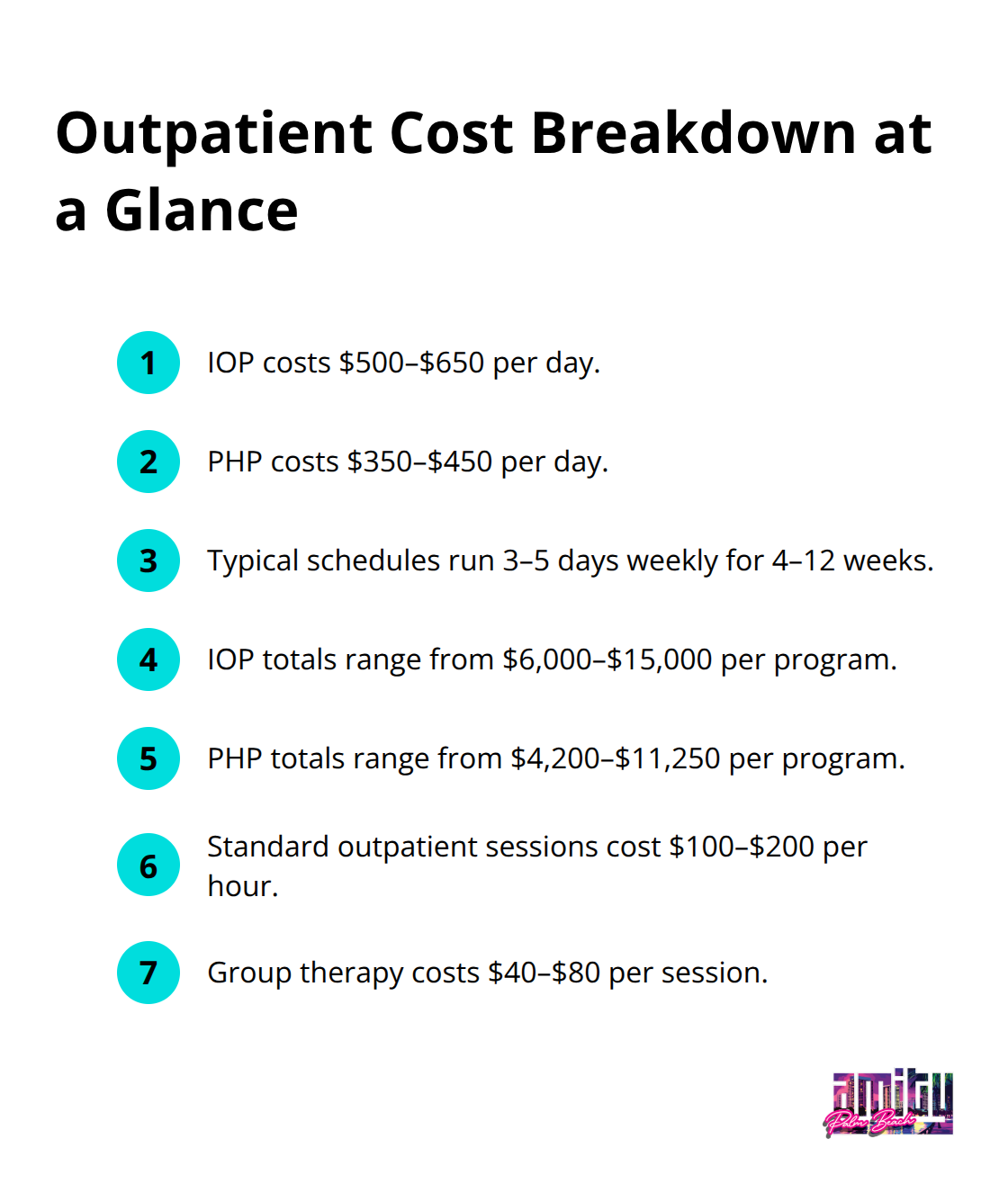
Medical Detox Demands Specialized Investment
Medical detox varies significantly in cost, with some programs available for free while others cost thousands of dollars daily. Alcohol detox typically runs 3-7 days, while benzodiazepine withdrawal can extend 10-14 days due to seizure risks that require intensive monitoring. Medication-assisted treatment during detox adds costs for drugs like buprenorphine or naltrexone (which proves essential for opioid withdrawal management). These upfront medical costs prove essential for safety – detox attempts without medical supervision create life-threatening risks that far exceed financial considerations.
Understanding these treatment costs helps you evaluate options, but insurance coverage and payment alternatives can significantly reduce your out-of-pocket expenses.
How Insurance Can Reduce Your Private Rehab Costs
Private insurance coverage for addiction treatment has expanded significantly since the Mental Health Parity and Addiction Equity Act of 2008 and the Affordable Care Act, which require most plans to treat mental health and substance abuse as essential benefits. Most major insurance plans provide coverage for treatment costs, but coverage varies dramatically between plans and providers. In-network facilities typically require copayments of $50-200 per day for inpatient treatment, while out-of-network providers may leave you responsible for 30-50 percent of total costs after deductibles. Research suggests that access to treatment remains limited, often due to insurance confusion rather than actual lack of coverage.
Understanding Your Policy Benefits
Your insurance policy contains specific language about addiction treatment that directly affects your costs. Most plans cover medically necessary treatment but define this term differently – some require failed outpatient attempts before they approve residential care, while others authorize immediate inpatient treatment for severe cases. Annual and lifetime benefit caps still exist in some older plans (despite federal parity laws), which can leave you responsible for costs after you reach these limits. Review your Summary of Benefits and Coverage document, which lists your mental health and substance abuse benefits separately from general medical coverage.
Maximizing Out-of-Network Benefits
Out-of-network reimbursement strategies can save thousands when your preferred facility doesn’t accept your insurance. Request a single case agreement from your insurer, which allows them to treat an out-of-network provider as in-network for your specific case – insurance companies approve these requests 40-60 percent of the time when medical necessity is clearly documented. Submit claims with detailed treatment plans and physician letters that explain why this specific facility is medically necessary for your condition. Appeal denied claims immediately, as 60 percent of initial denials get overturned on first appeal according to insurance industry data.
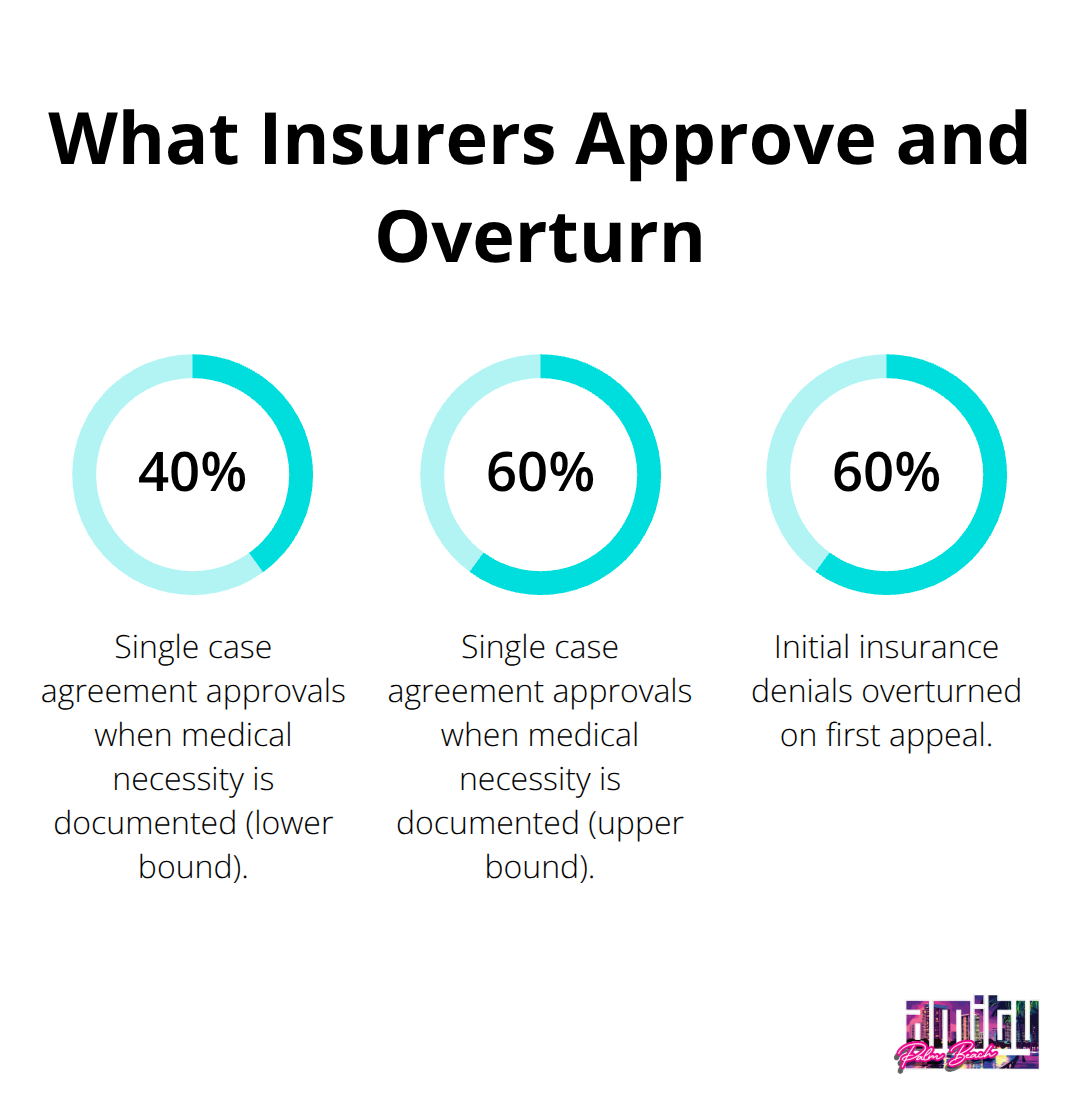
Alternative Payment Solutions
Most private rehab facilities offer payment plans with 0-6 percent interest rates for 12-60 month terms, which makes a $30,000 treatment program cost $500-800 monthly. Employee Assistance Programs through your employer often provide 3-8 free sessions plus treatment referrals with rates that facilities negotiate. Health Savings Accounts and Flexible Accounts cover all qualified addiction treatment expenses with pre-tax dollars, which effectively reduces costs by your tax bracket percentage. Some facilities offer sliding scale fees based on income, while nonprofit organizations like The Salvation Army provide free rehabilitation services for individuals who qualify.
Final Thoughts
The cost of private drug rehab represents a significant financial commitment, but the return on investment extends far beyond monetary considerations. When you compare the $14,000-80,000 investment in private treatment against the ongoing costs of addiction (which can exceed $30,000 annually for alcohol alone plus legal fees, medical expenses, and lost income), quality treatment becomes a financially sound decision. Higher-priced facilities typically offer lower patient-to-staff ratios, specialized medical supervision, and evidence-based therapies that reduce relapse rates by 15-25 percent.
These factors directly impact your long-term recovery success and reduce the likelihood of additional treatment episodes. Private rehab costs reflect the level of care you receive, with premium facilities that provide comprehensive support systems and individualized treatment plans. The investment in quality care often prevents the cycle of repeated treatment attempts that multiply expenses over time.
We at Amity Palm Beach work with most major insurance plans and offer flexible payment options to make quality care accessible. Our team provides free insurance verification and confidential assessments to help you understand your coverage options before you make treatment decisions. Contact Amity Palm Beach today to explore how we can support your journey to lasting recovery.

